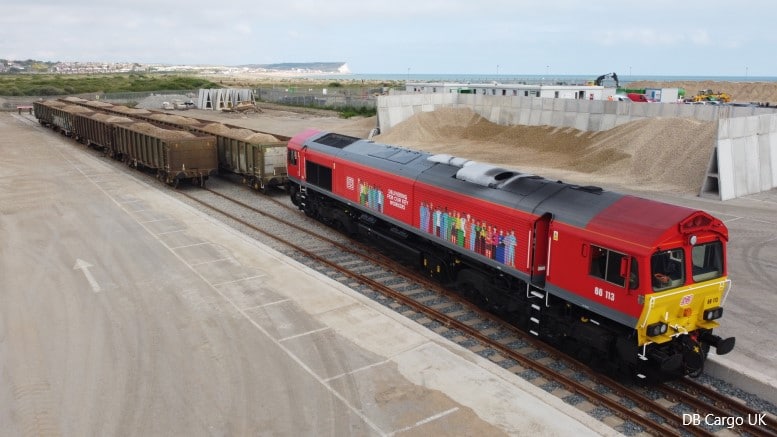

A new aggregate terminal at the site of the old Newhaven Marine station in East Sussex is now serving the busy construction industry, mainly in London, with aggregate, sand and gravel.
Newhaven Marine station closed to passengers on safety grounds in August 2006. Although it has continued to be used by some trains so as to fulfil legal obligations – the so-called Parliamentary Trains – it will close officially on 26 September 2020.
Network Rail has completed extensive modifications and refurbishment at the site, developing rail freight capacity for the transportation of marine-dredged sand and gravel, both important in the making of concrete and other materials for the construction sector, locally and in London.
The work – carried out in partnership with Brett Aggregates and the Newhaven Port Authority – sees the area open again after years of inactivity, providing much-needed local jobs.
The first DB cargo freight train, hauled by locomotive 66113, ran from the new terminal on Thursday 18 June 2020.
The new service will take lorries off local roads and reduce emissions as rail freight is much greener than moving goods by road and one freight train can carry as much cargo as 76 lorries.

Shaun King, Network Rail’s route for director Sussex, said: “The local communities we serve are vital to our success, so I am really proud of our team who worked hard on this important project to ensure the delivery of local benefits.
“The Newhaven terminal will create jobs, remove vehicles from our roads as well as contribute to our growing rail freight network.”
The COVID-19 crisis has been a boost to some freight services. With fewer passenger trains running, it has been easier for freight trains to move around the country – not only for those carrying food and supplies for the NHS, but for bulk cargo as well.
The challenge now is to maintain that position as passenger services start to get back to normal while, at the same time, the construction industry goes back to work.

Roger Neary, head of sales at DB Cargo UK, added: “The construction sector is seen by government as a key enabler to economic regeneration post-COVID 19, so services like this have an increasingly important role to play in the future of our country.
“We have a long-established relationship with Brett Aggregates and delivering the first train into the newly-refurbished station was a great honour for us.
“We look forward to working with all those involved to develop further rail freight solutions in the future.”

Tom Longland, managing director of Brett Aggregates, commented: “This is very good news for customers – not only locally, but we have also reinstated and significantly expanded the rail connection, enabling aggregates to be exported by rail across to meet construction demand in London.
“The first fully loaded train of aggregates left the site on Thursday 18 June bound for Capital Concrete’s Wembley batching plant.
“The effort by everyone on site to make the marine aggregates terminal fully operational has been tremendous, and we have built up a great working relationship with the teams at Newhaven Port, Network Rail and DB Cargo – this is a great result for everyone.”


Hardly a great result for everyone when taking into account yet more air pollution.
Despite reducing the HGV movements for transporting aggregates the terminal’s design should have taken into account the need to lowering air pollution.
So why advertise the use of a Diesel Electric Loco?
Even if there is may be no 3rd rail near Capital Concrete’s Wembley batching plant then surely you either change over to Diesel when at the nearest 3rd rail to Wembley – or better still run a “dual Fuel” Loco?
Standing at the Newhaven Town level crossing with an at least 21 year old Deutsches Bahn Diesel Electric pouring out diesel exhaust fumes out is really not acceptable.
More to the point with the new build at Newhaven why does that not have 3rd rail capability? Obviously the Design is failing in its Duty of Care regarding Air Pollution.
Planning Authorities, Building Control have all failed to address fundamental reduction of pollution requirements.
This situation needs to be changed to lessen air pollution, please will all responsible for the current unacceptable situation respond with how that will be achieved – and when it will be in place?